Pharmacology Essay: Reflections on Nursing Attachment Experience
VerifiedAdded on 2020/03/16
|6
|1051
|220
Essay
AI Summary
This essay provides a reflective account of a nursing student's attachment at Baret Polytechnic, focusing on their experiences in a cubicle where patients suffered from cancer, specifically colorectal cancer. The student details their responsibilities in caring for Mr. Pinte, a patient undergoing chemotherapy and treatment with monoclonal antibodies. The essay highlights the challenges encountered, including the administration of incorrect medication by a doctor, and the student's subsequent reflection on the incident. It further explores the patient's emotional and physical struggles, including complications like diarrhea, back pain, and joint inflammation. The student discusses their feelings of sympathy, guilt, and the importance of monitoring elderly patients. The essay concludes by emphasizing the learning experience gained, including skills in counseling and understanding atlizumab drugs used in cancer treatment. The student reflects on the importance of targeted therapy and the evolution of cancer treatment.
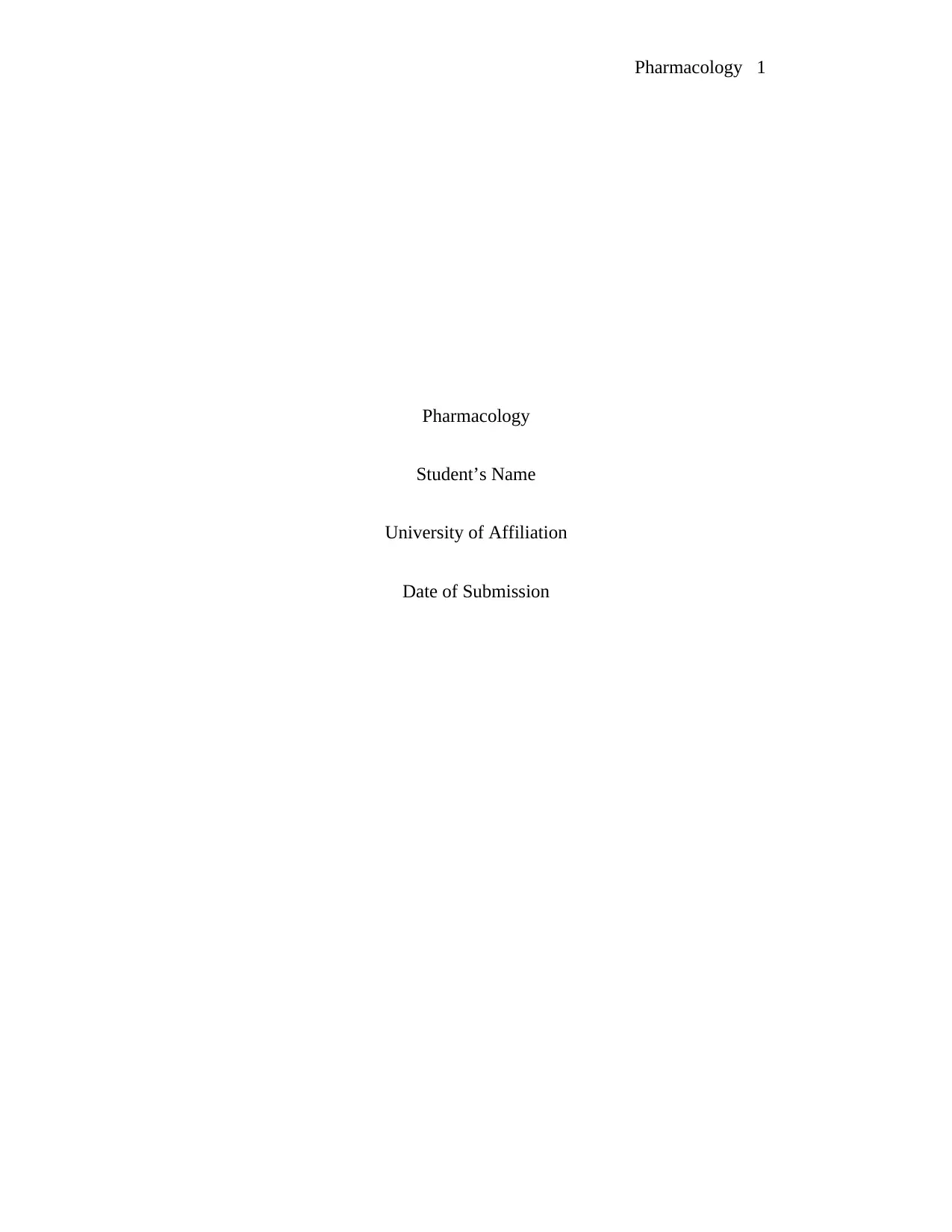
Pharmacology 1
Pharmacology
Student’s Name
University of Affiliation
Date of Submission
Pharmacology
Student’s Name
University of Affiliation
Date of Submission
Paraphrase This Document
Need a fresh take? Get an instant paraphrase of this document with our AI Paraphraser
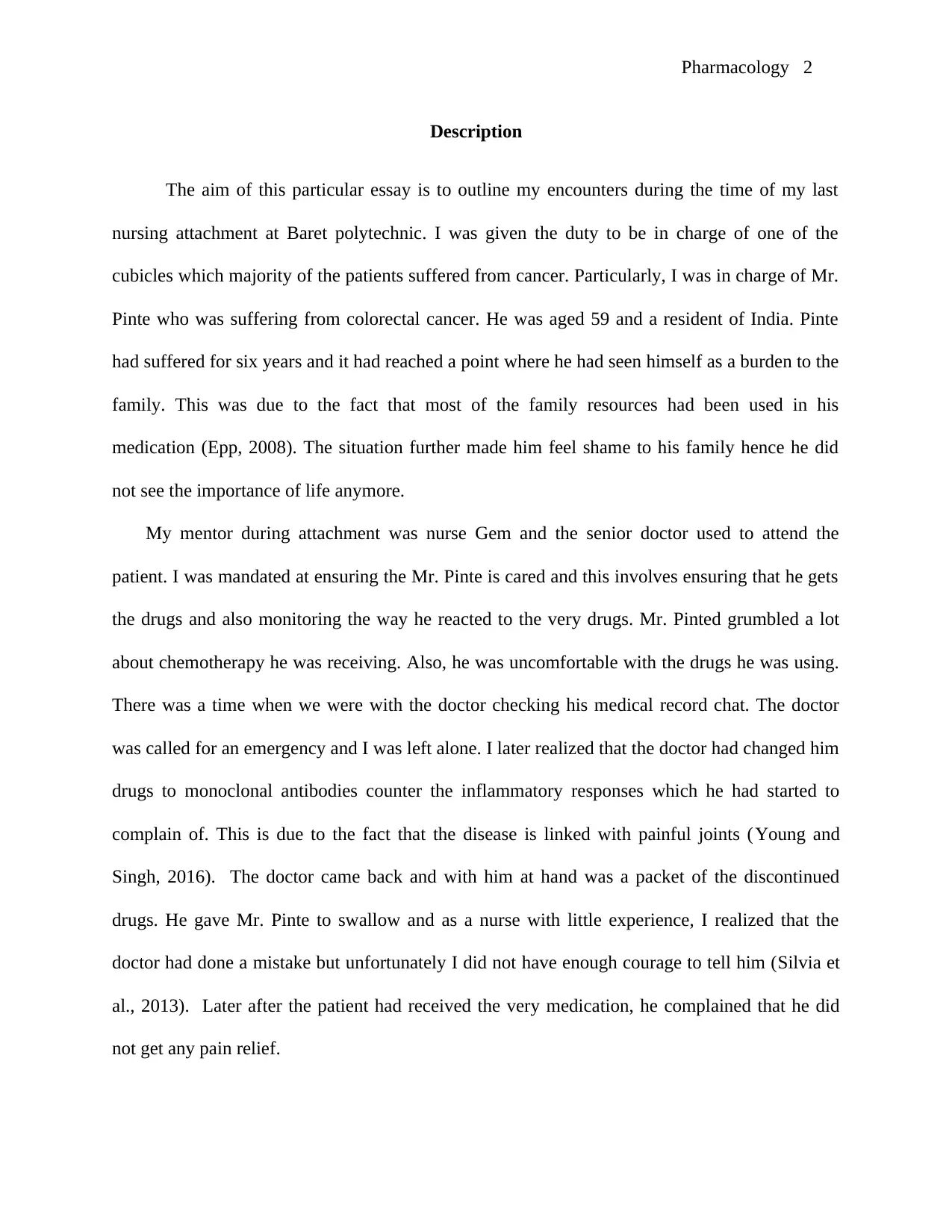
Pharmacology 2
Description
The aim of this particular essay is to outline my encounters during the time of my last
nursing attachment at Baret polytechnic. I was given the duty to be in charge of one of the
cubicles which majority of the patients suffered from cancer. Particularly, I was in charge of Mr.
Pinte who was suffering from colorectal cancer. He was aged 59 and a resident of India. Pinte
had suffered for six years and it had reached a point where he had seen himself as a burden to the
family. This was due to the fact that most of the family resources had been used in his
medication (Epp, 2008). The situation further made him feel shame to his family hence he did
not see the importance of life anymore.
My mentor during attachment was nurse Gem and the senior doctor used to attend the
patient. I was mandated at ensuring the Mr. Pinte is cared and this involves ensuring that he gets
the drugs and also monitoring the way he reacted to the very drugs. Mr. Pinted grumbled a lot
about chemotherapy he was receiving. Also, he was uncomfortable with the drugs he was using.
There was a time when we were with the doctor checking his medical record chat. The doctor
was called for an emergency and I was left alone. I later realized that the doctor had changed him
drugs to monoclonal antibodies counter the inflammatory responses which he had started to
complain of. This is due to the fact that the disease is linked with painful joints (Young and
Singh, 2016). The doctor came back and with him at hand was a packet of the discontinued
drugs. He gave Mr. Pinte to swallow and as a nurse with little experience, I realized that the
doctor had done a mistake but unfortunately I did not have enough courage to tell him (Silvia et
al., 2013). Later after the patient had received the very medication, he complained that he did
not get any pain relief.
Description
The aim of this particular essay is to outline my encounters during the time of my last
nursing attachment at Baret polytechnic. I was given the duty to be in charge of one of the
cubicles which majority of the patients suffered from cancer. Particularly, I was in charge of Mr.
Pinte who was suffering from colorectal cancer. He was aged 59 and a resident of India. Pinte
had suffered for six years and it had reached a point where he had seen himself as a burden to the
family. This was due to the fact that most of the family resources had been used in his
medication (Epp, 2008). The situation further made him feel shame to his family hence he did
not see the importance of life anymore.
My mentor during attachment was nurse Gem and the senior doctor used to attend the
patient. I was mandated at ensuring the Mr. Pinte is cared and this involves ensuring that he gets
the drugs and also monitoring the way he reacted to the very drugs. Mr. Pinted grumbled a lot
about chemotherapy he was receiving. Also, he was uncomfortable with the drugs he was using.
There was a time when we were with the doctor checking his medical record chat. The doctor
was called for an emergency and I was left alone. I later realized that the doctor had changed him
drugs to monoclonal antibodies counter the inflammatory responses which he had started to
complain of. This is due to the fact that the disease is linked with painful joints (Young and
Singh, 2016). The doctor came back and with him at hand was a packet of the discontinued
drugs. He gave Mr. Pinte to swallow and as a nurse with little experience, I realized that the
doctor had done a mistake but unfortunately I did not have enough courage to tell him (Silvia et
al., 2013). Later after the patient had received the very medication, he complained that he did
not get any pain relief.
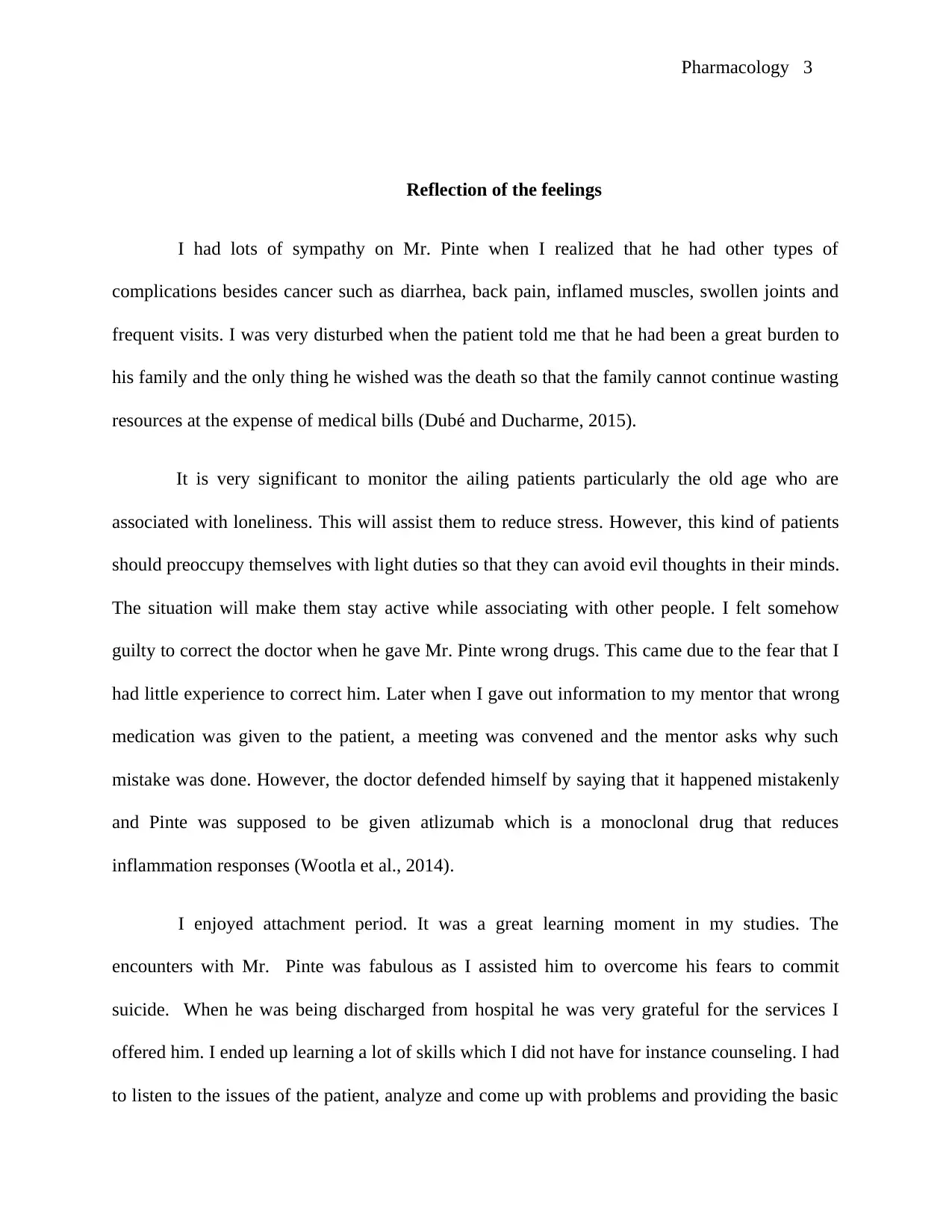
Pharmacology 3
Reflection of the feelings
I had lots of sympathy on Mr. Pinte when I realized that he had other types of
complications besides cancer such as diarrhea, back pain, inflamed muscles, swollen joints and
frequent visits. I was very disturbed when the patient told me that he had been a great burden to
his family and the only thing he wished was the death so that the family cannot continue wasting
resources at the expense of medical bills (Dubé and Ducharme, 2015).
It is very significant to monitor the ailing patients particularly the old age who are
associated with loneliness. This will assist them to reduce stress. However, this kind of patients
should preoccupy themselves with light duties so that they can avoid evil thoughts in their minds.
The situation will make them stay active while associating with other people. I felt somehow
guilty to correct the doctor when he gave Mr. Pinte wrong drugs. This came due to the fear that I
had little experience to correct him. Later when I gave out information to my mentor that wrong
medication was given to the patient, a meeting was convened and the mentor asks why such
mistake was done. However, the doctor defended himself by saying that it happened mistakenly
and Pinte was supposed to be given atlizumab which is a monoclonal drug that reduces
inflammation responses (Wootla et al., 2014).
I enjoyed attachment period. It was a great learning moment in my studies. The
encounters with Mr. Pinte was fabulous as I assisted him to overcome his fears to commit
suicide. When he was being discharged from hospital he was very grateful for the services I
offered him. I ended up learning a lot of skills which I did not have for instance counseling. I had
to listen to the issues of the patient, analyze and come up with problems and providing the basic
Reflection of the feelings
I had lots of sympathy on Mr. Pinte when I realized that he had other types of
complications besides cancer such as diarrhea, back pain, inflamed muscles, swollen joints and
frequent visits. I was very disturbed when the patient told me that he had been a great burden to
his family and the only thing he wished was the death so that the family cannot continue wasting
resources at the expense of medical bills (Dubé and Ducharme, 2015).
It is very significant to monitor the ailing patients particularly the old age who are
associated with loneliness. This will assist them to reduce stress. However, this kind of patients
should preoccupy themselves with light duties so that they can avoid evil thoughts in their minds.
The situation will make them stay active while associating with other people. I felt somehow
guilty to correct the doctor when he gave Mr. Pinte wrong drugs. This came due to the fear that I
had little experience to correct him. Later when I gave out information to my mentor that wrong
medication was given to the patient, a meeting was convened and the mentor asks why such
mistake was done. However, the doctor defended himself by saying that it happened mistakenly
and Pinte was supposed to be given atlizumab which is a monoclonal drug that reduces
inflammation responses (Wootla et al., 2014).
I enjoyed attachment period. It was a great learning moment in my studies. The
encounters with Mr. Pinte was fabulous as I assisted him to overcome his fears to commit
suicide. When he was being discharged from hospital he was very grateful for the services I
offered him. I ended up learning a lot of skills which I did not have for instance counseling. I had
to listen to the issues of the patient, analyze and come up with problems and providing the basic
⊘ This is a preview!⊘
Do you want full access?
Subscribe today to unlock all pages.

Trusted by 1+ million students worldwide
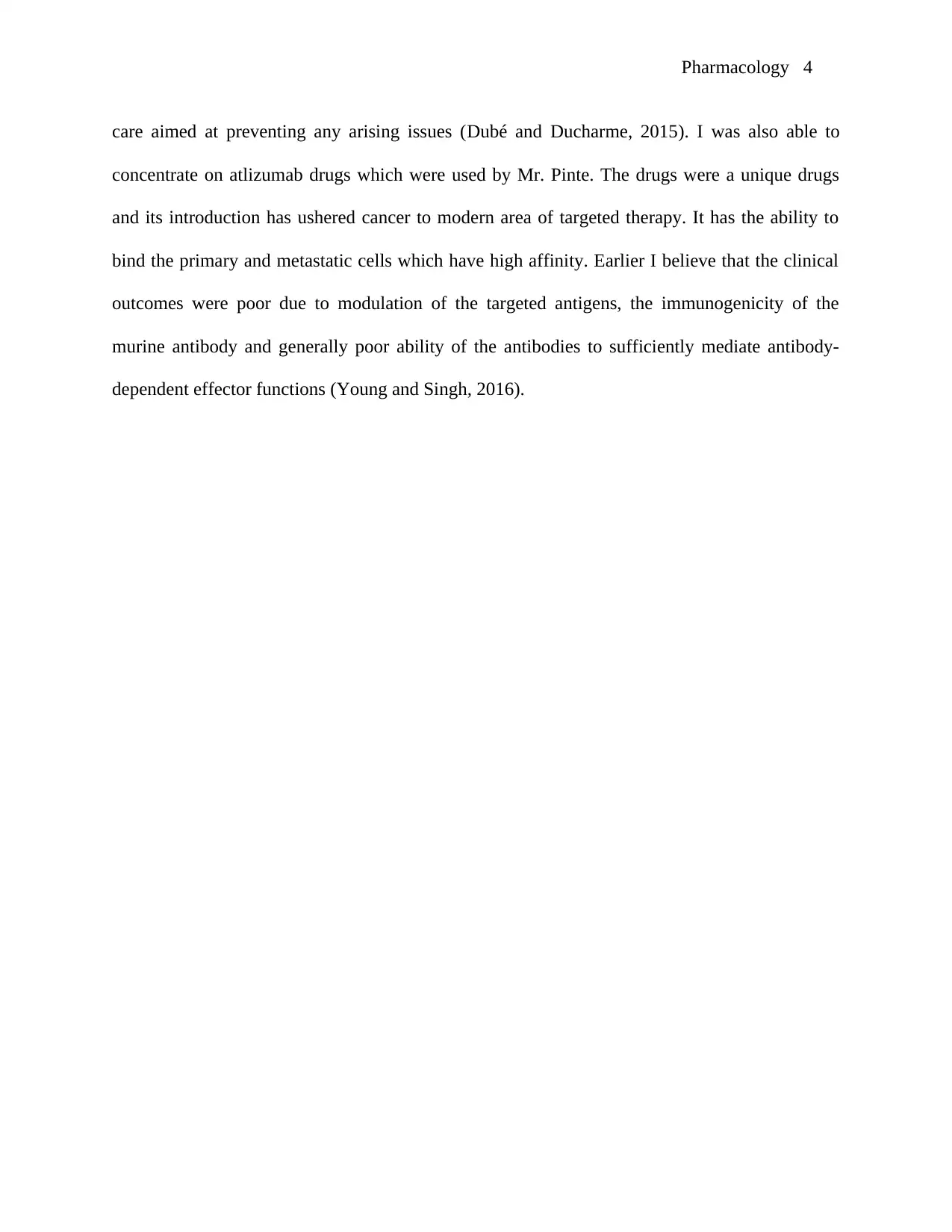
Pharmacology 4
care aimed at preventing any arising issues (Dubé and Ducharme, 2015). I was also able to
concentrate on atlizumab drugs which were used by Mr. Pinte. The drugs were a unique drugs
and its introduction has ushered cancer to modern area of targeted therapy. It has the ability to
bind the primary and metastatic cells which have high affinity. Earlier I believe that the clinical
outcomes were poor due to modulation of the targeted antigens, the immunogenicity of the
murine antibody and generally poor ability of the antibodies to sufficiently mediate antibody-
dependent effector functions (Young and Singh, 2016).
care aimed at preventing any arising issues (Dubé and Ducharme, 2015). I was also able to
concentrate on atlizumab drugs which were used by Mr. Pinte. The drugs were a unique drugs
and its introduction has ushered cancer to modern area of targeted therapy. It has the ability to
bind the primary and metastatic cells which have high affinity. Earlier I believe that the clinical
outcomes were poor due to modulation of the targeted antigens, the immunogenicity of the
murine antibody and generally poor ability of the antibodies to sufficiently mediate antibody-
dependent effector functions (Young and Singh, 2016).
Paraphrase This Document
Need a fresh take? Get an instant paraphrase of this document with our AI Paraphraser
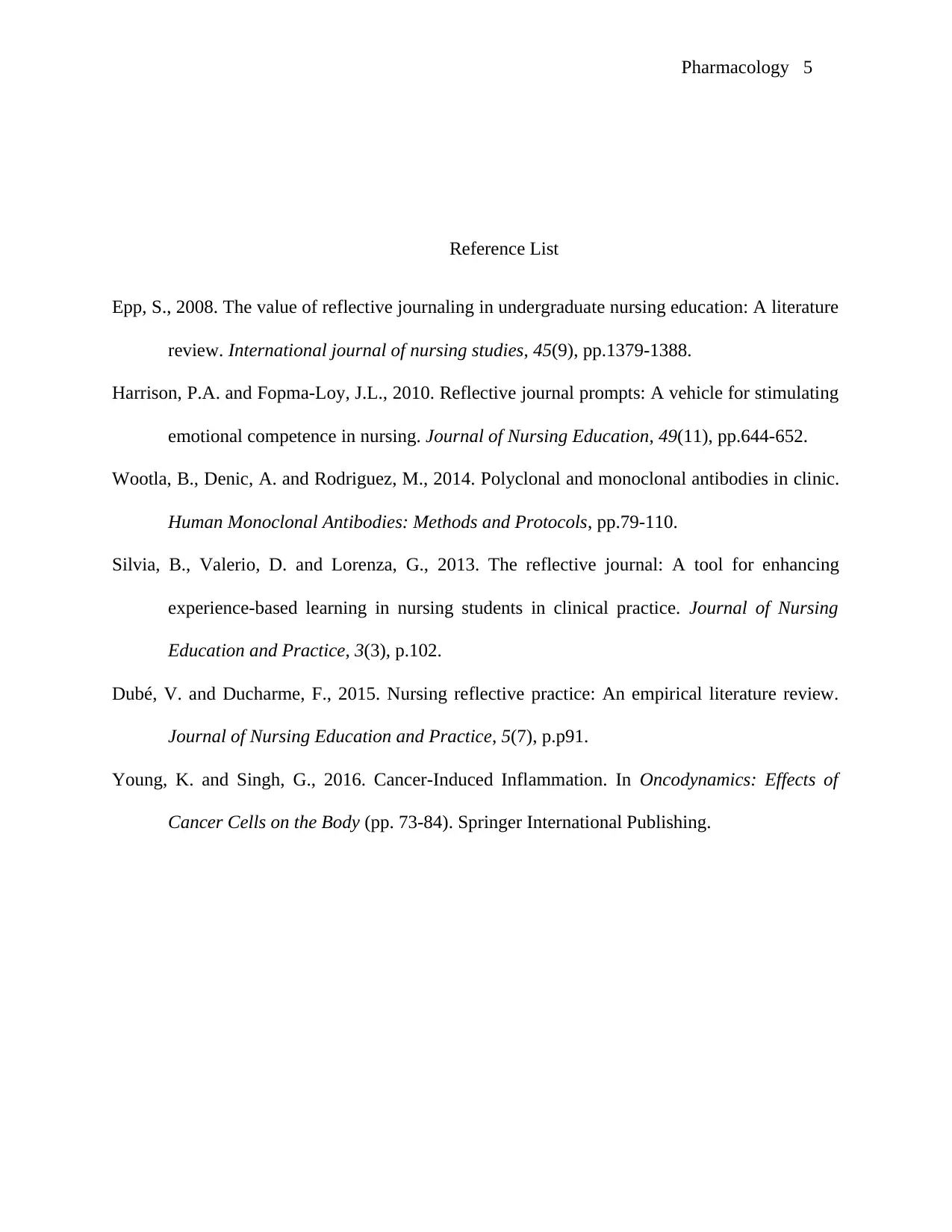
Pharmacology 5
Reference List
Epp, S., 2008. The value of reflective journaling in undergraduate nursing education: A literature
review. International journal of nursing studies, 45(9), pp.1379-1388.
Harrison, P.A. and Fopma-Loy, J.L., 2010. Reflective journal prompts: A vehicle for stimulating
emotional competence in nursing. Journal of Nursing Education, 49(11), pp.644-652.
Wootla, B., Denic, A. and Rodriguez, M., 2014. Polyclonal and monoclonal antibodies in clinic.
Human Monoclonal Antibodies: Methods and Protocols, pp.79-110.
Silvia, B., Valerio, D. and Lorenza, G., 2013. The reflective journal: A tool for enhancing
experience-based learning in nursing students in clinical practice. Journal of Nursing
Education and Practice, 3(3), p.102.
Dubé, V. and Ducharme, F., 2015. Nursing reflective practice: An empirical literature review.
Journal of Nursing Education and Practice, 5(7), p.p91.
Young, K. and Singh, G., 2016. Cancer-Induced Inflammation. In Oncodynamics: Effects of
Cancer Cells on the Body (pp. 73-84). Springer International Publishing.
Reference List
Epp, S., 2008. The value of reflective journaling in undergraduate nursing education: A literature
review. International journal of nursing studies, 45(9), pp.1379-1388.
Harrison, P.A. and Fopma-Loy, J.L., 2010. Reflective journal prompts: A vehicle for stimulating
emotional competence in nursing. Journal of Nursing Education, 49(11), pp.644-652.
Wootla, B., Denic, A. and Rodriguez, M., 2014. Polyclonal and monoclonal antibodies in clinic.
Human Monoclonal Antibodies: Methods and Protocols, pp.79-110.
Silvia, B., Valerio, D. and Lorenza, G., 2013. The reflective journal: A tool for enhancing
experience-based learning in nursing students in clinical practice. Journal of Nursing
Education and Practice, 3(3), p.102.
Dubé, V. and Ducharme, F., 2015. Nursing reflective practice: An empirical literature review.
Journal of Nursing Education and Practice, 5(7), p.p91.
Young, K. and Singh, G., 2016. Cancer-Induced Inflammation. In Oncodynamics: Effects of
Cancer Cells on the Body (pp. 73-84). Springer International Publishing.

Pharmacology 6
⊘ This is a preview!⊘
Do you want full access?
Subscribe today to unlock all pages.

Trusted by 1+ million students worldwide
1 out of 6
Related Documents
Your All-in-One AI-Powered Toolkit for Academic Success.
+13062052269
info@desklib.com
Available 24*7 on WhatsApp / Email
![[object Object]](/_next/static/media/star-bottom.7253800d.svg)
Unlock your academic potential
Copyright © 2020–2026 A2Z Services. All Rights Reserved. Developed and managed by ZUCOL.





